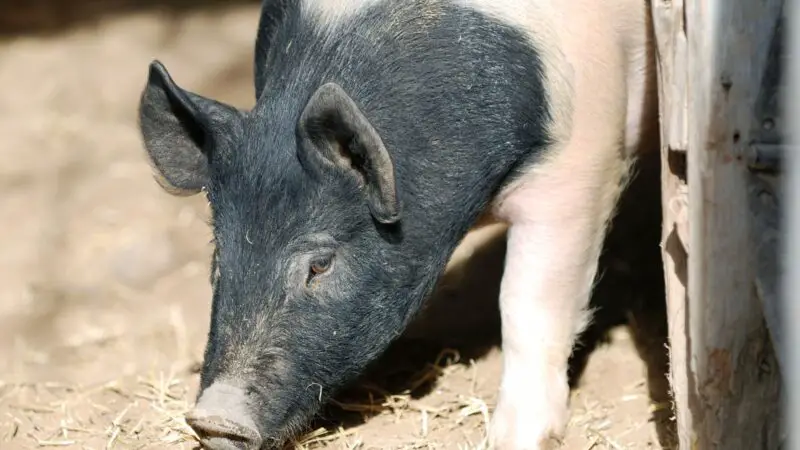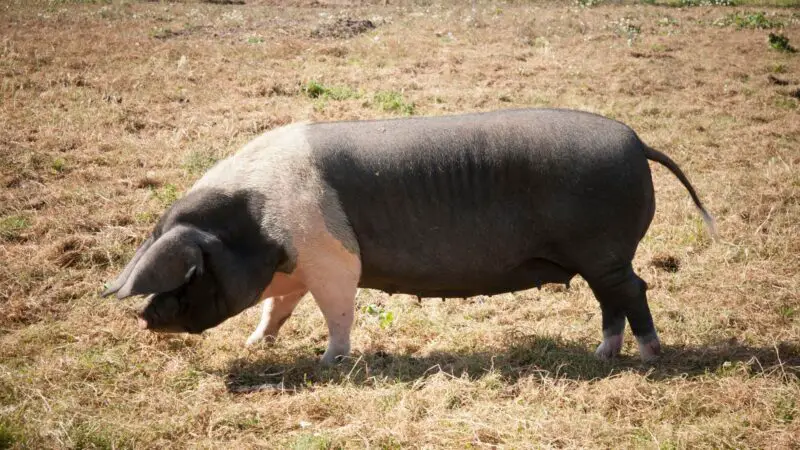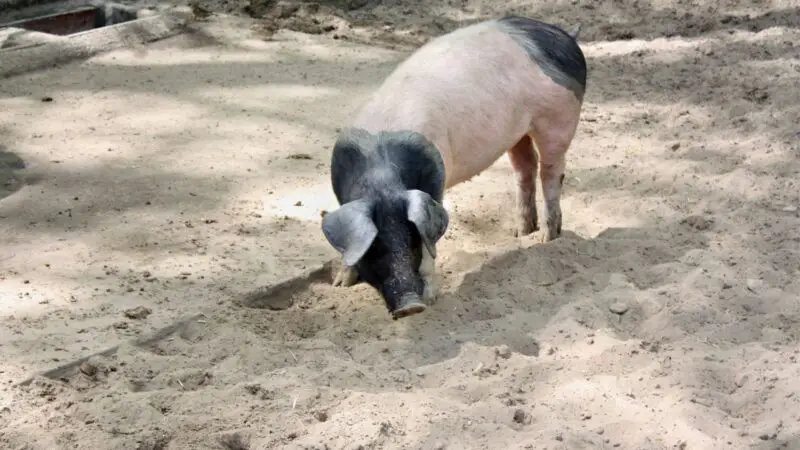A Hampshire pig is a medium-sized, domestic pig breed known for its distinctive black and white appearance, as well as its excellent meat quality. Primarily, these pigs are bred for pork production, but they can also be kept as pets or used for exhibition purposes.
In this article, we will delve deeper into the world of Hampshire pigs, exploring their history, identifying their characteristics, and discussing their uses. Keep reading to discover more about this fascinating and unique breed.
The History of Hampshire Pigs

Hampshire pigs have an interesting history, dating back to the early 1800s in England. They were initially bred in the county of Hampshire, which gave them their name. Eventually, the breed made its way to the United States, where it gained popularity for its excellent meat quality and adaptability to different climates and conditions.
Is a Hampshire Pig a Good Breed?
Yes, the Hampshire pig is a good breed for various reasons. They are hardy animals, capable of thriving in diverse environments. Their exceptional meat quality and fast growth rate make them an ideal choice for pork production. Additionally, Hampshire pigs are known for their docile temperament, making them suitable as pets or show animals.
Hampshire Pig Identification

What Do Hampshire Pigs Look Like?
Hampshire pigs are easily identifiable due to their unique black and white appearance. They have a black body with a white band encircling their front legs and shoulders. They also have erect ears, which give them an alert and intelligent expression.
How Long Does a Hampshire Pig Live?
Hampshire pigs typically live for 6 to 8 years. However, their lifespan may vary depending on factors such as diet, environment, and overall health.
What Do Hampshire Pigs Eat?
Hampshire pigs are omnivores and thrive on a diet consisting of grains, vegetables, fruits, and protein sources like soybean meal. As domesticated pigs, they can be fed commercially prepared pig feed or a balanced homemade diet.
How Big Do Hampshire Pigs Grow?
Hampshire pigs grow to an average weight of 600 to 800 pounds, with some reaching over 1,000 pounds. They have a muscular build and are known for their lean meat.
Are Hampshire Pigs a Heavy Breed?
Hampshire pigs are considered a medium to heavy breed. Their size and weight contribute to their reputation for high-quality meat production.
What Is Hampshire Pig Known For? Purpose [Meat, Pet, Etc]
Hampshire pigs are mainly known for their excellent meat quality, which is lean and well-muscled. However, they can also be kept as pets or used for exhibition purposes due to their docile temperament and striking appearance.
Where Do Hampshire Pigs Originate?
Hampshire pigs originate from the county of Hampshire in England, where they were initially bred in the early 1800s.
What Are the Distinct Characteristics of a Hampshire Pig?
Some distinct characteristics of Hampshire pigs include their unique black and white coloration, erect ears, muscular build, and fast growth rate.
Hampshire Pig Temperament
Hampshire pigs are known for their docile and friendly temperament. They are generally easy to handle and can be trained for various tasks, making them suitable for both experienced and novice pig owners.
Are Hampshire Pigs Good for Meat?

Yes, Hampshire pigs are highly regarded for their meat quality. Their lean and well-muscled bodies produce high-quality pork with excellent flavor and texture.
Are Hampshire Pigs Good Mothers?
Hampshire sows are known to be attentive and nurturing mothers. They have strong maternal instincts, which contribute to the overall health and well-being of their piglets.
How Much Are Hampshire Pigs Worth?
The price of Hampshire pigs can vary depending on factors such as age, size, and pedigree. On average, a Hampshire piglet can cost between $50 and $300, while a mature pig or breeding stock may cost upwards of $500 or more.
How Do You Take Care of Hampshire Pigs?
Taking care of Hampshire pigs involves providing a clean and safe living environment, a balanced and nutritious diet, fresh water, and proper veterinary care. Regularly clean their living quarters and ensure they have adequate space to roam and exercise. Additionally, socializing and interacting with your pigs can contribute to their overall well-being.
Tips in Breeding Hampshire Pigs
When breeding Hampshire pigs, consider the following tips:
- Choose healthy and genetically superior breeding stock to improve the quality of the offspring.
- Provide a comfortable and stress-free environment for the sow during gestation and farrowing.
- Monitor the health and well-being of both the sow and piglets throughout the breeding process.
- Implement proper biosecurity measures to minimize the risk of diseases.
- Keep accurate records of breeding and health-related information for future reference.
How Much Pasture Does a Hampshire Pig Need?

Hampshire pigs should have access to at least 50 square feet of outdoor space per pig. This allows them to roam, root, and forage, which are essential for their physical and mental well-being. Additionally, providing access to pasture can contribute to their overall diet and improve the quality of their meat.
Interesting Facts About Hampshire Pigs
- Hampshire pigs are one of the oldest recognized American pig breeds.
- They have been used in crossbreeding programs to improve the meat quality of other pig breeds.
- Hampshire pigs are known for their excellent feed efficiency, which contributes to their fast growth rate and lean meat production.
Final Thoughts
Hampshire pigs are a versatile and unique breed, known for their striking appearance, excellent meat quality, and friendly temperament. Whether you’re interested in raising them for pork production, as pets, or for exhibition purposes, they are sure to be a rewarding and enjoyable addition to your farm or homestead.
Related: Black and White Pig Breeds? | the Ultimate Guide
List of Sources
Student Research on the Hampshire College Farm: Raising Pigs Outdoors in Natural Settings
